Thursday 29th, Fri 30th Sept - Scene Design

This lesson began in the waiting room of Glenfield Dental Surgery as Marie got scaled and polished. It finished in Cornwall Park (pictured), Greenlane, in the brilliant sunshine of Friday morning!
I was looking at scene design, chapter 10 of
Story. Scenes are what makes up Acts, as I discovered
last Friday.
"A scene is a story in miniature ... No matter locations or length, a scene is unified around desire, action, conflict and change."

Scene design, this chapter told me, was about
- turning points
- setups/payoffs
- emotional dynamics
- choice
First, turning points. Every scene is a minor, moderate or major turning point. Turning points are about
surprise. A really good surprise moment sends you back through the film, picking up the clues that now seem so obvious in light of the surprise revelation.
The best example of a very major turning point is the climax of
The Sixth Sense, where (SPOILER ALERT!!) Bruce Willis realises he's, well, dead. And not just a little bit, either.
Interestingly, the film actually shows some of those clues, because in initial screenings they found the audience didn't really get what was going on. So they cut in the boy saying "They don't even know they're dead". (Thanks to the film
Edge Codes for that insight!)
That was a brilliant "aha!" moment. One of my favourites of all time. So was Darth Vader saying "Luke,
I am your father!" So was Humphrey Bogart's character realising that Ilsa thought her husband had died, then discovered he was alive.
"The effect of a beautifully turned moment," says McKee, "is that the filmgoers experience a rush of knowledge
as if they did it for themselves."
He then said something very interesting about the writing craft: it's not through your language that self-expression really comes, that's just surface. It's through these moments, these
turning points that true self-expression as a writer comes.
Fascinating!
Setups and payoffs... at a
Janet Roach workshop I attended earlier this year, she said "Never set up what you don't pay off. Never pay off what you haven't set up."
Says it all, really. Payoffs are another way of pleasantly (or not) surprising your audience. He suggests sometimes we can think of really bizarre payoffs and be put off, "that doesn't really happen". But try it, he says, go pay and create a setup for that weird payoff you've just thought of. "Reasoning is secondary and postcreativity." Introduce the absurd, then go back in the story and plant the seeds.
Emotional dynamics ... there are only two real emotions, says McKee. Pleasure and pain. Everything else is a variation on one or the other.
"Feeling makes emotion specific." Feeling or mood is a way of foreshadowing, a way of preparing or shaping the audience's anticipations.
Mood is carried across in your writing, in the lighting, camera angles and acting styles. But mood can't substitute for emotion. Confused?
There's an example of a scene where the emotion turns from bad to good, but the mood is up for grabs.
To summarise (don't want to quote too much of the book here!) two lovers are estranged, the guy has left the girl but wants to come back. She won't let him in, he breaks the door down, she threatens him with a gun, they fight, the spark comes back, they make love, they're reconciled (only in Hollywood, huh?).
The emotion in that scene goes from pain to pleasure. But the mood could be a comedic one (believe it or not) ... it could be slapstick humour, with Jim Carrey playing the guy. Sunshine, wide angle shots that let the actors use their whole bodies.
Or it could be a thriller. Clint Eastwood (perhaps in his younger days?) playing the guy. Dark, tight camera angles.
There's the difference. Emotion changes, and the scene turns. Mood is just the way you tell it.
Choice... a very important part of storytelling. You need to put your character into situations where they face difficult choices. "The choice between good and evil or between right and wrong is no choice at all," writes McKee, because people will always choose what's right to them.
What happens, though, when they're faced with two right choices that contradict each other? Dr. Who was confronted with this one recently... destroy the Daleks forever, but also all the humans on earth? Or don't destroy them, and let the Daleks exter-mi-nate the humans anyway?
Your character needs to choose "between irreconcilable goods, or the lesser of two evils."
"Choice must not be doubt but dilemma, not between right/wrong or good/evil, but between either positive desires or negative desires of
equal weight and value."
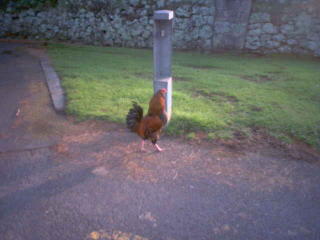
Wednesday 28 Sept - Postmodern f(r)ictions
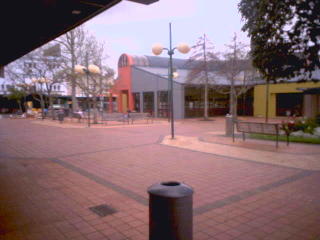
A slightly more prosaic choice of classroom venue today: the Pt. Chevalier public library. Marie's day off from work, too much rain, no chance to walk but a chance for us both to study.
I don't know where the stereotype of libraries being quiet places came from... what with the slightly deaf old lady catching up loudly with the librarian, to the annoying squeak coming from the revolving newspaper rack (which Marie eventually picked up and moved), to the general clatter of conversation. Methinks Pt Chev needs another pub, one with books!
Anyway, I got to read chapter 7 of
The Writing Experiment, and discover (or have defined for me)
Postmodernist fiction.
It was quite an appropriate chapter to read, after McKee's previous chapter on Act design. McKee is great, because he's going by what's proven, tried and tested.
The Writing Experiment, on the other hand, is always about testing the boundaries, taking the path less traveled. Both approaches have their merits.
So, getting started, what characterises postmodernist fiction?
- questions the concept of "plot"
- subverts the notion of three-dimensional "real" characters, sometimes making them just caricatures.
- uses allegory, fantasy and new worlds to escape from - or enlarge on - realist writing and the "straitjacket" or representation.
- "the death of the author" - writing is no longer about the single author, coming from multiple sources, whether that's a collective of writers or just many sources (like found writing, or different non-literary genres).
Matter of fact, in Whitcoulls the other day I saw a couple of books - "Q" and .... ah, can't remember - written by a collective. The name of which I can't remember, either. Used to be Luther something, now it's a Chinese name. Wu something.
Anyway...
PLOT
The traditional idea is what we've been learning about in
Story: it hinges on rising and falling action.
The oldest model for plot is the
Freytag pyramid. A modern
narratologist would define a plot as a sequence of events, causal links, arousal of expectations with various alternative outcomes. Kind of sucks the life out of it, that kind of definition.
Interesting quote from the book:
"Used too tightly, [plot] can stifle digression, open-endedness, philosophical rumination, symbolic significance and generic variety (??). It may also result in an unnecessary emphasis towards catastrophic events, rather than significant, small-scale ones."As I'm learning from
Story, that ain't necessarily so. The structure may sound over-dramatic, but can be applied to the very commonplace things in life successfully. I remember a short film I saw once (very long ago) about a man walking to work, unconsciously racing the people he's walking with. When he 'loses', he complains and they're all surprised that he had this race thing in his mind. Anyway...
Writing offers some ways to subvert the idea of plot:
- raising but not fulfilling expectations
- raising non-specific expectations
- over-determined plot
- conflicting storylines - they make us see the other side of the story
There are also ways to subvert the idea of
character. What specifically comes under attack here is the idea of unity of a character. Postmodern fiction creates "splintered subjectivity". Some novels you'll read where you're confused who is who, for instance three characters that end up being the same person, even though one is described in the first person, and the other two in the third person.
This is the kind of thing that you can't really do in film, or even really on radio (though you could try). It's one of the advantages of the book genre.
You could use
nonhuman characters to "highlight the blindness and prejudice of anthropocentricity." (!) Life from a banana's point of view could be quite interesting!
Or you could deliberately choose characters who have been marginalised because of race, gender, sexuality, disability, etc. It's a dangerous game to take on the voice of one of these people if you are not one of these people. ("One of these people"! Sounds terrible)
"You are always implicated in your own cultural context," warns the book. "If you are a westerner trying to write from a non-Western perspective, it may be impossible for you to totally bridge the gap." What does this mean for my idea of a science fiction novel set in the future where the main drivers are Chinese, Indian and African? ;)
Then there's historiographic metafiction (rewriting the past) and fantasy (creating new worlds). "Creating new worlds defamiliarises our own, making us see it afresh."
Creating a whole new world lets us ask questions, because there are no assumptions.
- is it close or distant in time from our own time? Or is it a mixture - castles and chariots with radios and cellphones?
- physical composition of world - like ours? Different gravity? What do people look like?
- religion - is there any? What do people generally believe in this world? Is it universal like Catholicism was during the Middle Ages, or is it pluralistic like today, where people believe all sorts of things.
- Political, economic organisation? Is it a totalitarian state? A representative democracy? Or is it a futuristic total democracy, where technology and education allows everyone to vote on every issue?
- Gender roles?
- Ethical basis of society? Is it okay to kill? When?
- New words and concepts - George Orwell's 1984 was full of words similar to our own, but with new meanings
- Topography, location?
- Narration, focalisation - whose point of view are you taking?
Topped off the lesson by reading an interview with George Lucas in the June issue of
Rolling Stone. It's good to go to the library sometimes!
Hitch-hikers' Guide to the Galaxy, TV version
Had a great video-watching day today, watching the 1981 TV version of The Hitch-hiker's Guide to the Galaxy. Brilliant.
After watching
the movie earlier this year, I thought I'd order the TV version from
Movieshack. My list is so long that I only got the DVD this weekend.
Back in 1981 I was just a little fella and 9:30pm was "really late" for me to watch TV, but I do remember being allowed to watch at least two episodes, and I particularly remembered the very last, with Louis Armstrong's "What a wonderful world" playing. I remembered that oddly satisfied feeling that the ending of the series brought.
Watching it now as a grownup, I thought it would look really naff, particularly when compared with the movie. But no, on every level, particularly the acting and special effects, I was really impressed.
Sure, the effects were 1980s pre-digital effects, but they were done with a great deal of effort. I guess the main reason they stood out to me was I'd just seen some footage from Dr. Who in the 1960s, when visual effects were done in a rushed manner, and without a lot of technical effort. (It seems, anyway. Maybe it was the best they could do with what they had available.)
But the acting and the writing are the things that have sustained The Guide throughout all it's media adventures - radio show, record, TV series, computer game, books, and now movie. And apparently a beach towel.
If a great story simply starts with a "What If?" question, Hitch Hikers Guide just never stops asking those questions. It has a universe that is internally consistent - it follows its own rules, even when there's an Infinite Improbability Generator nearby. In fact such organised chaos is what makes it such a cool story. The radio plot is slightly different from the record, which is different from the TV show, which is different from the books, and the movie is different again. But it doesn't matter, because the whole story is about the improbably coming true.
It's really neat to return to the works which shaped my young imagination (Hitch Hiker's Guide, Dr. Who, Blakes 7, Star Wars, Star Trek, Knight Rider to name a few) and see them through my eyes now, see why they appealed so much to me. I guess this helps me make sure that stories I write in the future will be for me, whether me now, or the younger me. If I try to write for anyone else I will not be writing truly. If I write for myself, the right people will like it.
Unless, of course, I'm a total freak.
Which is, of course, the fear of all of us. Maybe that would make a good theme for a story. Someone who discovers they are a total freak, completely unlike anyone around them.
Friday Sep 23 - Act Design

I was a bit unsure whether to venture out, because the day started off pretty rainy. But by the time I stepped out the door, there was a rainbow. I took it as a thumbs-up!
Having reached the limit of the path of the Oakley Creek (and not owning a good pair of waders) I did variations on a theme, walking through the nearby streets to get to the halfway point of the Oakley path, then doubling back towards Unitec.
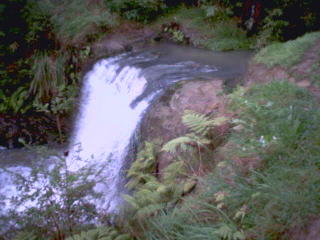
Ended up finding my "classroom" in front of a waterfall. Absolutely beautiful, fairly noisy. Which was okay, except for the one phone call I got.
So I sat there and learnt about
Progressive Complications, which began chapter 9 of
Story.
It works like this: your protagonist starts out to do something, expecting things to behave normally. But they don't; in fact they go against him/her.
So, he/she (this is going to get tiresome; I'll use he, but you know what I mean) takes action to restore balance, and make things normal again.
The idea behind progressive complications is that things just heat up throughout the story. The stuff that happens to your character heats up; his reactions heat up. There's no point him doing something he could have done in an earlier scene - it's
boring.
McKee introduced a law in this chapter, his law of conflict:
Nothing moves forward in a story except through conflict.
Which is well illustrated by
one of my favourite Simpsons episodes, where a concerned Marge writes to the creators of Itchy and Scratchy, asking can they make it less violent please.
The result? An Itchy & Scratchy show where they "love and share", and there's no conflict. It gets really boring, really fast!
Conflict runs on three levels:
- inner - like a stream of consciousness novel, not often found in films
- inter-personal - like a soap opera, it's all about the interpersonal relationships
- extra-personal - our hero vs. the world. Like James Bond.
McKee points out that if you choose just one of those, you need lots of characters to make it work. And lots of settings. It gets pretty expensive.
However, if you combine all three, you can come up with a really emotionally satisfying story, and not as many characters and settings.
Then he talked a bit about pacing in a three act drama. Usually, a movie is two hours, your first act (which contains your Inciting Incident, remember) being about half an hour, and your third act (climax) being 20 minutes tops. That leaves an awful lot of time for your second act. And it's in the second act that many stories start to lag.
So what can you do? Introduce subplots. If your main story is about interpersonal conflict, add a subplot of inner or extrapersonal conflict.
Of course, if you're working on a short story or a short film, you don't need to worry so much about subplots.
You might remember I mentioned sometimes you delay the Inciting Incident in order to reveal character. This happens in Rocky, because you need to know how downtrodden the character is before he takes up his first fight. However, all that character revelation doesn't feel like the story is moving, so there's a love story in there as well. A subplot, that plays out on a different timescale to the main plot.
Some other neat little tidbits:
- The penultimate climax (ie usually your act 2 climax) must be the opposite of the ultimate climax. If penultimate is good, ultimate must be bad. Vice versa.
- You can use a subplot to contradict the Controlling Idea (remember that?) of the Central Plot "and thus enrich the film with irony".
- Or you could use your subplot to confirm the Controlling Idea, enriching the plot with "variations on a theme".
- I'll quote directly here, because I wouldn't try to rephrase this: "If a subplot doesn't thematically contradict or resonate the Controlling Idea of the main plot, if it doesn't set up the introduction of the main plot's Inciting Incident, or complicate the action of the main plot, if it merely runs alongside, it will split the story down the middle and destroy its effect." Yikes.
Last word: "You're free to break or bend convention, but for one reason only:
to put something more important in its place."
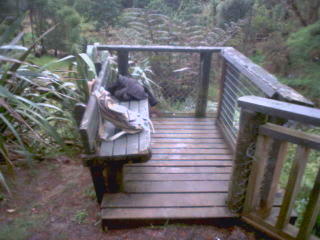
Thursday - Dialogue

I'm back to school!
And starting today, this blog is visual as well as verbal. It started with this fantastic holey log I saw on the way to "school" today. This is on the Oakley Creek Walkway, at the Mount Albert end.
I thought "Damn, I forgot my camera". Thank God for the cellphone! :)
I had a specific goal in mind today: find out where that other path went. In fact that's my specific goal most times I'm walking. I hate just walking, but I love discovering.
Last time I'd discovered the end of the Oakley Creek path: a small reserve with a playground at one end. But I hadn't explored the other end, and it looked interesting. So, tired and sweaty as I was, I went up the gentle hills and trekked until I found the end. And it was....

...the train track!
That was kinda exciting and disappointing at the same time. Exciting because, wow, it's a train track! Disappointing because there was no getting across, and nothing particularly to get across to (unless I wanted to scale the barbed wire fences at the back of Pak'n'Save!).
Anyway. I went back to the playground and studied today's chapter of
The Writing Experiment: Dialogue.
"Dialoguing is fundmental to the way we use language: we are usually speaking to, or writing for, someone."
In a break with tradition, I actually did most of the exercises today instead of just reading about them. I had the benefit of an early start (7:30am when I sat down at the playground, pictured).
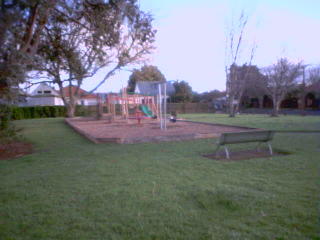
I marvel all the time at the difference in approach between
Story and
The Writing Experiment.
Story is all about character;
Writing encourages you to use words themselves to generate literature.
So to begin dialogue, simply have a question with different answers. The answers explicitly or implicitly begin to tell a story. The example question in the book was "What time will you be home tonight?", which could be an innocent question or a loaded one. And the answers usually told you what the question really meant.
So I tried the question/answer thing, and here's what I came up with:
Q: What's the score?
A: Dunno.
(apathetic)A: 13 - 24. We're winning!
(enthusiastic, these two dialoguists are having a good time)A: The score for what?
(either sarcastic or ignorant. Not meaningful communication)
A: Yes, what's the score indeed...
(sarcastic, casting aspersions)A: Stop being distracted!
(trying to talk about important stuff, interrupted by sports)
A: Always about the score, isn't it... ?
(Um.. dunno. Just snarky, that one)
Then we went into realist vs. non-realist dialogue. Realist dialogue is what you'll find in most plays, movies and novels. Non-realist is what you'll find in some modern literature, but it doesn't tend to sell well because nobody understands it!
However, a good example of nonrealist language was George Lucas' first film
THX-1138, which used nonsensical word combinations to create a feeling of unease. It worked there because it was in some sort of context.
So, my attempt at a simple realist dialogue. It got quite dramatic:
1. Are we there yet?
2. Not far to go now. How're you feeling?
1. Still a little woozy. What time are we getting there?
2. Shouldn't be long to go.
1. I'm not feeling well...
2. I know. Hold tight; we're nearly there.
1. I don't think I can make it.
2. Come on, you can make it-
1. I...
2. Come on, we're nearly there. Don't give up now-
1. Give... up...
2. Don't! We're nearly there!
Sad story, huh? So then I non-realisticised it:
1. Are we there yet?
2. Spring is soon
1. Why is you?
2. Nonsense. Wouldn't have it any other way.
1. Really?
2. Yes. When are we there?
1. Yesterday I suppose. Don't know really.
2. Looks like rain.
1. Impossible.
2. Impressive. We're there.
Ridiculous, but then that's the idea. I found that hard because I like to create things that mean something.
The next thing was about power relationships in dialogue, the background coming from the theories of Michel Foucault that every relationship is about power. And therefore, about politics. I hate thinking like that, it doesn't come naturally to me and I don't agree that this power thing is as all-pervading as Foucault proposes. But I can understand it in certain settings.
For the exercise I did a piece of dialogue that showed a change in the power relationship. See what you think:
1.
(Immigration officer) Will you be visiting on leisure or business?
2.
(Foreign traveller) Uh.. sorry, leisure?
(doesn't understand)1.
(slowly) Lei-sure.
2. I don't understand.
1.
(louder) Leisure. Will you be visiting on LEISURE or business?
2. Do you mean... holiday?
1. Yes, holiday. Holiday or business?
2. I ... yes, holiday.
1. Right.
2. And business.
1.
(pauses) Both?
2. Yes.
1. Both leisure and business
2. That is correct
1. What is the nature of the business?
2. I give talk on uh... tourism.
1. A talk on tourism?
2. Yes, how you say, lecture.
1. Oh.
2. Yes on how the immigration process can make visitors feel, uh, how you say...
1.
(makes vague guilty, embarrassed, helpful sounding grunts... she doesn't know what word he's reaching for)
2. Disempowered... yes, that's the word. Disempowered.
Dialogue can change the power relationship, or go from low levels of communication to high levels (or vice versa). It struck me as similar to the
Story idea of beats or events which are all about something
changing for the protagonist.
Writing's example was Jane Eyre's proposal scene, where at first the characters are hiding their feelings from each other. As Jane confesses her feelings for the guy, the scene progresses to where they're communicating well.
Here's my attempt at a dialogue which starts out on a very low level of communication, and in the end breaks through into clear, open communication:
Two guys
1. Gidday mate!
2. Oh, gidday, how's it going?
1. Yeah good, hey what're you doing after work?
2. After work?
1. Yeah, how'd you fancy a bite to eat?
2. Uh... no, I'm okay actually
1. Nah, nah, my shout mate, honestly
2. Oh, don't worry about me...
1. I insist. (sobers) Please.
2. Uh... sure.
(pause)2. Everything okay with Jennifer?
1. How did you -
(his voice breaks) No. Everything's not okay.
2. What's wrong?
1. Me!
(angry) I'm wrong. All the time. I'm Mr. Wrong!
2.
(pause) Gee. Dunno what to say.
1. She's left me, John.
2. The bitch.
1. Watch out what you say; I still love her!
2. Just trying to sympathise mate.
1. Yeah, I know. Thanks.
2. Let me guess. You knew I'd understand, right?
1.
(nods)
2. Did Jenni leave you for another guy?
1.
(pause) I don't know for sure. But yeah... I think so...
2. And you think
you're wrong? Mate! ... So where are we going for tea?
I'm still not really really happy about the end line. The sentiment is, now I understand you, and I understand why you wanted to have dinner with a friend rather than alone.
So that was dialogue. There was a bit more, which I didn't get the opportunity to do the exercises for (it rained). But it was great to get my teeth into this chapter, a real enjoyment.
On my way back I surprised a pukeko, which ran off then flew to the top of a tree:

Can you see the pukeko? (Sorry, no zoom lens on my phone!)
This WEEK's lesson!
Boy, it has certainly been out of routine for me. A conference on Monday and Tuesday and catch-up the rest of the week. However, I did get one good lesson in on Wednesday, but not amongst the rabbits and ducks.
This week's lesson comes to you from the waiting room at Koala Autos where my car got it's Warrant of Fitness, then from the waiting couch at New Lynn Barbers, and later in the day from the car outside Marie's work before I picked her up. So this lesson will probably be more urban and/or suburban. :)
This lesson was from
Story, Chapter 8, the Inciting Incident - the point in a film where you wonder "What will this lead to?". McKee's official definition of the Inciting Incident is that it "radically upsets the balance of forces in the protagonist's life."
And, of course, the protagonist has to try and bring back balance. This is obvious in action films like DIE HARD, where the antagonist commits a crime, and the protagonist has to work to bring the criminal down.
But what about romances? Or subtle, arty films? The best ones all have this Inciting Incident aspect to them. McKee quoted someone (who? Can't remember and too lazy to look it up) who said an Inciting Incident can be as simple as a woman putting her hand on the table and looking at the protagonist in "a certain way". :)
The main thing I remember about the Inciting Incident is that it makes the audience picture the climax. For instance in JAWS the sheriff hears about the shark, and you know in your heart of hearts that the sheriff and the shark will meet face to face at the end. What you don't know - and it would spoil it if you did know - is who will survive that meeting.
Another lesson was that story is about character change. If the character doesn't change, there's not much of a story (or a very frustrating one). However, change doesn't mean anything until it's been put to the test.
McKee gives the example of TENDER MERCIES, a film I'd like to see, where a guy turns away from alcoholism to become a responsible father. His new life is put to the test, though, when his daughter dies. As McKee says, if he needed an excuse to have a drop to drink, that's it. And so that film's big question is, who will win, the man or his addiction?
Lastly, there's no point jumping into the Inciting Incident unless you know enough about the protagonist to make sense. THE LAST SAMURAI is a slow-building film, because we need to know that Algren (Tom Cruise's character) is extremely capable (even when drunk) but self-destructive and careless of his own life.
LAST SAMURAI's Inciting Incident comes quite a way into the film, where Algren's western-trained troops are massacred by the samurai and he is captured. But we need the build-up to understand who he is.
Finally (really) here's a neat quote from McKee: "Story - when it is art - is not about the middle ground of human experience."
Darn. So my idea for a movie about socks is not likely to win any awards - or audiences. ;)
Blogger Buzz: The Future of Moviegoing
Blogger Buzz: The Future of Moviegoing
Interesting!
A gem from Constantine
Over the weekend I watched
Constantine. Not bad. Pretty whacked theology, but a kinda compelling main character and a surprise-filled plotline. They also did the George Lucas thing of creating a different world and just assuming you know the rules - even though you couldn't possibly.
Anyway, a gem from the director's commentary: if you need to do exposition (explanation of the story) do it while the main character is working. Constantine's work involved investigating and fighting demons, so his day at work made for interesting viewing.
Putting story in the context of work rings a bell of reality in the viewer/reader. After all, we all have to work, and our work takes up a lot of our life. Therefore, it becomes a certain part of our identity.
Stephen King identified the same thing in
On Writing : A Memoir Of The Craft
. Another good book that I should probably reread sometime.
Advice from Joe Eszterhas
MovieMaker Magazine | Issue #59 | The Indie Summer Blockbuster
I haven't heard of Joe Eszterhas before (sounds like a Hungarian surname!) but I have heard of Basic Instinct and Flashdance at least. Some very gritty advice from him on the link above. Thanks to Skip Press' HollywoodWriters yahoogroup for the link.
Harry Potter: Great story, bad writing?
No school-in-the-park today (rabbits and ducks most distressed!) but a good discussion over drinks at the end of the first day of the Conferenz Media Relations Conference, where I was speaking today.
Brett from MAF, Angie and Alison from Waikato University, and (oops! didn't get her name) from NZ Post were standing around talking about ... well, all sorts of things!
One thing: Harry Potter. I've got to confess, I haven't read any of the Potter books. Not because I think they're occult and evil (well, I won't know until I read them!) but just because I tend not to read fiction; there's so much non-fiction for me to read.
Anyway, Bret and Alison were saying Potter is over-written. Could do with some severe editing. And kids find it hard to read. Worse so with the later books - maybe JK Rowling is getting careless?
Anyway that's what they said, and I remembered, story isn't the same as writing. Good to get both things down pat.
Then we started telling another story, and here it is without any context, and with a few embellishments I thought up as I drove over the Harbour Bridge:
Benji was a beagle who worked at the airport. His job was to sniff out food, and when he did he got rewarded. But when Benji got too old for working at the airport, he was pensioned off and sent to live with the Howe family.
The Howe family were nice, but they didn't understand him. He would sniff the kids' packed lunches and try to let them know there was food there, but they didn't reward him. What was he doing wrong?
One day, it was all too much for him. Benji decided to end it all. He started swimming out into the ocean. On and on he swam, but he didn't drown.
Instead, Benji reached Australia. Sydney. Circular Quay. Benji climbed up some steps and decided to look around. Maybe there was some food he could point out!
Instead, he discovered a rat the same size as him, a huge beast, with a tweed cap and a waistcoat, smoking a pipe.
They fought and fought outside McDonalds in Circular Quay. At night.
And there they are to this day, fighting.
Interesting story, huh? :)
Today's and Yesterdays Lessons: Story Design and Narratology
Missed a chance to blog yesterday, so catching up on two days' worth here. Once again, the two books are somewhat dovetailing with each other. I love it when that happens.
Yesterday I was in the city (Auckland) after attending the
Marketing Association's Brainy Breakfast. So school was in Albert Park, and despite being evangelised to once, I was pretty much able to enjoy the quiet and the different environment... and learn about Story Design from the book
Story.
Story design starts with a strong protagonist - the character you identify with. It's more important that your protagonist be someone people can
relate to, rather than
like. Think of Macbeth: a ruthless killer. Yet because he soliloquizes to us, the audience, we know what he's thinking, how guilty he's feeling, and we think yes, that's just like me!
Story happens when your protagonist wants something - it may be adventure, treasure, immortality, or even, as in
The Patriot, a quiet, peaceful life with freedom - and can't get it.
Story doesn't happen unless the protagonist can't get what they want ... and when life surprises them like this, they take action to try and move closer to what they want, being blocked all the time.
In terms of the desire, its value is determined by how much your protagonist is going to risk. Take The Patriot again for example... Mel Gibson's character just wants a quiet life, but also freedom. Is he willing to risk his life for that freedom? Not at first; he doesn't want to get involved. But when the nasty-piece-of-work British makes neutrality impossible, you'd better watch out. He's willing to risk anything now.
Essentially story is this. The chapter had a lot more to say about character, but that was the essential point on how to structure a character. McKee also had this to say: "Fine writing emphasises REACTIONS."
Why? Because when we watch or read a story, we all of us think, "What would I do?" And that's really what a writer has to do in order to make the story authentic: "What would I do if I were this character?"
Today's lesson, from
The Writing Experiment, was mostly on a bench at the Halibut Reserve in Mt. Albert, and when it started raining, the Avondale Library (yes, a long walk, and I didn't smell too good!).
The chapter on Narratology was the best I've come across so far in
The Writing Experiment, I suppose because I'm biased towards realist narrative fiction at the moment, rather than the many other genres and forms out there.
Narratology is an analytical system for understanding narrative structure. It breaks down narrative into its constitutive parts. So while story is the "what" of narrative,
discourse - the "how" of narrative - is what narratology is concerned with.
Basically (and the chapter is anything but basic, so I may be oversimplifying here), there's:
- What type of narrator: first person, second person, or third person? First and third are most common, but sometimes second person "you" can be used. It often makes the piece more intimate or sometimes, more intimidating.
- Sometimes the narrator types are messed up: you'll have first, second and third person in the same piece, referring to the same person. Designed to mess with your head, in order to understand a frame of mind, or identity crisis, or just confuse you :)
- There was a bit of talk about how much power the narrator has over a story. As the storyteller, you control everything the reader knows about the subject (if it's fiction). You can make absolute use of this and manipulate the reader, or be really democratic and present the story from multiple points of view.
- Narrative foreshadowing is really very simple ... the addition of phrases like "...as Sophie would discover later" lets the reader know to look out for something later. A bit like the cliffhanger endings they used to have on Dr. Who.
- Absent narrator - yes, you can tell a story with no narrator, by the use of non-literary elements, like "found texts" discussed last time.
- Focalisation or Point of View is different from the type of narrator. First person is usually likely to give the narrator's point of view, but third person can experiment with presenting several character's points of view. At school we called it the "Eye of God" approach.
- Similar to what Story said about building character, you build Point of View not from a preconceived idea, but from sensing feeling and thinking about an event from the character's point of view.
The last segment of the chapter talked about narrative restructuring. Not many stories start at the beginning and work their way through exclusively chronologically to the end. You've got to work out how to fit the story together, and basically you're free to try whatever you want.
For example, Martin Amis' novel
Time's Arrow or the Nature of the Offence goes backwards in time as a disembodied soul examines the life it has lived. Then there's that movie Guy Pearce was in about memory... name, anyone?
The chapter closed by saying "all narratives lie at a point along the continuum between open and closed". A closed ending is the ending
Story recommends, one where all the loose ends are tied up, the mystery is solved, etc. An open ending is like it sounds - the loose ends remain trailing, and it's up to the reader to figure it out.
Some good stuff. My head is reeling, and I haven't even done the practical exercises yet.
No class on Monday and Tuesday; I'm speaking at a conference. So, see you on Wednesday!
Today's lesson: Recycling/Controlling idea
For once my two books weren't on the same subject, so my brain had to work overtime this morning. Also, there was a dead rabbit on the way to my usual bench :-(
Writing talked about recycling writing - using writing from other sorts in your own writing. It's not plagiarism (unless you don't acknowledge the source!), it's using someone else's ideas to springboard your own. Or even just taking writing from disparate sources and putting them together in a way that suggests new meaning.
This literary device has a lot in common with the kind of stuff
Not the Nine O'Clock News team and
Monty Python did - taking disparate elements (in their case film footage) and putting them together to create new meaning, mostly ironic or ridiculous.
Writing recommended several ways of recycling writing, starting with a collage - the old fashioned way, with scissors and glue.
There's also "found text", for instance an advertisement, a bus ticket, some other non-literary piece of writing, and giving it artistic significance by calling it art. Sounds dodgy (and often is), but in its defence found text (and its visual counterpart found art) calls into question what is art? A good question to ask. It also helps us look at the everyday in a new way.
In a way, sampling in music is doing the same thing, except the samples are often of something (e.g. a line in a movie) that already has cultural resonance, ie: it means something to the listener.
Gosh, I'm sounding like an academic!
The last suggested way of recycling writing was rewriting a classic text or fairytale from a modern point of view. Saw this on
Desperate Housewives the other night, when the mother in charge of the school play wanted Red Riding Hood NOT to kill the wolf, but instead to "rehabilitate" it.
Going back to found text, it's an idea I'd had before, after seeing works of art which incorporated text with the imagery of a chess game. It was quite compelling and for me combined emotion and intellect - something that McKee talked about in his chapter this morning.
My 'found text' idea came when I was looking through some documents from around the time my dad died. The order I was looking at them told its own story:
- A traffic infringement ticket, when my father drove into a parked car because he didn't realise his left eye was totally blind.
- His draft letter of resignation, replete with typographical errors and suffused with regret. And denial.
- His terse letter to the department of Inland Revenue, asking for a rebate on expenses he has incurred for work.
- A telegram from my mother to my uncle, informing him of the time of death.
- The involved documentation between lawyers and accountants, sorting out probate and arranging a waiver of rates for my mother, my sister and I, now without income.
The fact that these documents are official and to do with everyday things just heightens the emotions. To me, anyway, but then it's my life. In fact, it's a life I was unaware was taking place - I was just four. As an adult I read these documents and wish I had been able to help.
Writing is so about self-psychoanalysis!
Anyway,
Story today was about structure and meaning. Every good story has a premise - what the writer thinks when they start - and a controlling idea - a theme or underlying message of the film.
Premise is usually a question: "What if...?"
"What if aliens were already here?"
"What if four astronauts got super powers?"
"What if superheroes were outlawed?"
Controlling idea is something that happens when you take the climax of the film, and explain it.
For instance, the climax may be: "Justice triumphs" when the good guys catch the bad guys... but why did the good guys catch the bad guys?
"Justice triumphs... because the good guys are smarter than the bad" (Colombo) ... OR
"Justice truimphs... because the good guys are ruthless and violent" (Dirty Harry)
That was the essence of this entire chapter. And also saying that you don't force the controlling thought on the story; it presents itself to you. It's about revealing the truth, not forcing the story to conform to an ideal.
He also mentioned about a film being a conflict between "the idea" (e.g. justice triumphs) and "the counter-idea" (e.g. crime pays).
The ups and downs of the movie have justice triumphing in one scene and crime paying in the next. The temptation for an ideologically driven film is to make the idea of "crime pays" really weak, in order to make "justice" look stronger. But a good writer is able to present the counter-idea at its strongest, so the real idea stands up and proves how really strong it is.
Good morning's learning, dead rabbit notwithstanding. I love life!
Today's lesson: Structure
Both
The Writing Experiment and
Story had to tell me about structure today. But they meant different (though overlapping) things by the word.
Writing told me all about:
- linearity (describing things as they happen)
- repetition (e.g. a poem that always starts or finishes with the same phrase)
- variation (which is like repetition of similar-but-distinct things, e.g. a poem with a verse about blue, then green, then red, etc.)
- simultaneity (when you have two parallel lines of ... I was going to say dialogue. Can be dialogue, narrative, or whatever)
- multilayering (combining several of the methods we learnt earlier - like word association, for example - like a club sandwich, using different methods as layers)
- number (X amount of words per line, or lines per stanza, for example a haiku structure - but of course the book recommends you create your own instead of using existing structures)
Writing also explored what it called non-literary structures, the more familiar (to me) forms of advertisements, websites, recipes, diary entries.
Coming across that was like the first time I was in Sydney, my first overseas trip as an adult. Wandering through the city centre on a Sunday morning, I caught a glimpse of the familiar logo of the Bank of New Zealand. Whoopee! The familiar!
So that's literary structures. I then went into
Story structures - beginning with the age-old argument whether plot or character is more important.
McKee solved that pretty quickly - character (true character, not
characterisation)
is plot.
In other words, characterisation is the superficial, what we easily know about someone: their race, gender, social status, job, clothing, style.
Character is what comes out under pressure. Squeeze a grape and get wine. Squeeze your main character and what will you get?
So
plot simply comes about as you put the pressure on the character. Their choices shape the rest of the story.
So that was my structure lesson this morning. I must say I'm really enjoying the outdoor classroom, even when the seat is wet from a brief shower of rain. I hope the ducks and rabbits in the park don't mind me sharing it with them.
Not the 9o'clock news
Got the DVD of the Best of Not the 9 o'Clock news recently ... I was too young to see them when they first came out (a bit rude in some bits!).
Gosh, those guys are funny. You can see Atkinson having some pre-Mr. Bean moments as that character began to form. Alas Smith and Jones are just smashing comedians - and actors for that matter. And Pamela Stephenson is funny! All I really knew about her was that she was married to Billy Connolly - who guests here a couple of times - but I'd never heard or seen much of her comic performances.
Anyway, the best thing about NTNON isn't so much its writing - although that is good - it's the delivery, plus the editing. These guys picked up where Monty Python left off, knowing just what you could do with close cuts to incongruous things, and tying in contiguous scenes with the flimsiest of premises.
Brilliant. I want to be like that when I grow up. :)
Review: Sun After Dark by Pico Iyer
Time magazine's William Boyd says, "Pico Iyer is among the finest travel writers of his generation."
I'd have to agree. Not that I've combed the breadth and depth of 'travel writing', but I have just loved
Sun After Dark : Flights into the Foreign
, Pico Iyer's latest book.
I got it expecting vivid descriptions of exotic locales, and that I got, but more than that,
Sun After Dark is an inner journey as well. I should say a series of journeys, as the book includes pieces from the mid-90s through to 2002, but in reality it's a unity: seeing the world through the eyes of Pico Iyer.
Paradoxically, learning of a place that I'm seeing very consciously through the eyes, perceptions, memories of someone else, actually helps me understand that place more. Perhaps a bit like Being John Malkovich? Perhaps not quite, but surprisingly similar.
Iyer takes you to deserted Yemen, magic (in both ways) Bali, Cambodia's ancient capital of Angkor, and also introduces you to people: Leonard Cohen, now living with Buddhist monks in California; and the Dalai Lama - the rock star spiritual leader whose quest to free his country fades further in the background as the world demands answers to peace and happiness from him.
In one remarkable chapter, Iyer also discusses the country that never existed until half a century ago - the land of jetlag.
Iyer's writing is delightfully imperfect - he tends to use long ellipses in the middle of short sentences - and conversational.
Want to go places? Start with
Sun After Dark : Flights into the Foreign
. I can't remember the last book I read that left me with such an urge to simply be myself.
Today's learnings - GENRE
Had a different venue for school today - Cornwall Park, in Auckland's suburb of Royal Oak. Took a while for the sun to really come out but it is nice to notice it's getting lighter earlier.
Today I was getting the same message from both barrels: Genre.
The Writing Experiment said there were really only three basic genres: realism, surrealism and satire.
Of course there were many other ways of classifying writing, but those ones were helpful for what I was learning. The exercise for today, writing a realistic character description, that is, something that we can relate to in the real world. Here's what I wrote:
His keen blue eyes surveyed the surface of the wood for any imperfections. Large hands, sandpapered rock hard, turned the object over, making sure that glue and nails had done their job. He stood up and stretched, realising he had been in an uncomfortable crouching position for some time. As he did, he caught his own reflection in the mirror. Where once had been sandy-coloured hair, the colour of stone began to show through.
As I type this out, I realise some areas I could tighten up on. That's one of the first things I learnt about writing, you can always say it better with less:
His keen blue eyes surveyed the surface of the wood for any- take out imperfections. Large hands, sandpapered rock hard, turned the object over, making sure that glue and nails had done their job. He stood up - take out and stretched, realising he had been in an uncomfortable crouching position for some time or, had been crouching uncomfortably for some time. As he did, he caught his own reflection in the mirror. Where once had been sandy-coloured hair, the colour of stone began to show through.
So anyway, that's realistic, descriptive writing. The next challenge was to write it in a surreal way, where the impossible can happen. I'm surprised that I found this hard, particularly when I'm fond of the Goon Show, Monty Python and the Simpsons... here's what I came up with:
His keen blue eyes stared as the wood's pattern moved like that of a kaleidoscope. Surely wood didn't do that. Then the object began to turn itself, shifting in and out of shape, ensuring he saw all the mistakes he had made in its construction, its pattern now turning into a juvenile, accusing face.
That kind of gave me a psychological theme: this creation is the man's child. So for the satirical description - which, again, I found hard, without some definite theme - I used the same story but made the character shallower and more archetypical (the father who loves to lose himself in the workshop):
His eyes gazed on his most beloved child - a bookshelf. The workshop walls were lined with his previous favourites - children who had outgrown their novelty and, instead of leaving home and starting their own families, now silently gathered dust in the gloom. Their father stretched, glimpsed himself in the mirror, grinned, and reflected: "I'm a legend!"
Like I said, no theme. But that's where this book is interesting: it aims to help you know where to start, even when you don't have an idea.
However, what I'm learning in
Story - and I think just how I am as a person - is showing me that you need ideas, you need story. You need substance.
After going through the three basic genres,
The Writing Experiment talked a bit about poetry. That was kind of cool, but the trouble with some of the modern stuff is it makes absolutely no sense except to its writer. That's fine as self-expression, if the writer simply wants to express themself to themself. But I believe art should communicate, and you need some common standard to do that.
Meanwhile,
Story had a word or two about genres as well. Instead of looking at genres of
writing, this looked at genres of
story, and specifically movies.
There are a lot! As you'll no doubt see every time you go to the video store. And they're constantly evolving, changing to reflect society.
Key takeaways from this mornings
Story readings:
- Your story should reflect the present, even if it's a historical or sci-fi drama. It needs to be relevant to the zeitgeist of the time.
- Figure out what genre your story will be in, and research that genre real good. Why? Because your readers or viewers will know it, and they'll know if you're unconsciously doing something that's been done before, and be bored with it.
I was enjoying myself so much I went on and read the chapter on research. When you write a story, you research three things:
- Your memory. What emotional experiences can you bring to this story so you can relate?
- Your imagination. Fill in the gaps where you can't relate. Write a day in the life of your protagonist.
- The Facts. Pretty important, but rightly in the third place on this list.
Phew. Big stuff there! More tomorrow, back in my normal "classroom" at Waterview Downs.
Team America: World Police
This movie is incredibly hilarious. Sure, most of the humour comes from saying inappropriate things in settings where you wouldn't ordinarily hear that sort of stuff, but it still works.
For example, the theme tune - just like the kind of theme songs for cartoons when I was little - but with potty-mouthed words: "America! F%&# yeah!"
The creators of this film were right, any action film with puppets would be funny, just because it's puppets.
But story-wise, these guys actually put together a good show. It was obvious and transparent how they set things up and paid them off, but that transparency or cynicism actually makes it easier to see how stories are put together.
And of course, we couldn't get too emotionally attached to the characters, because they were f%&*$ng puppets! ;) As we were reminded every time the strings showed, or especially when they walked!
Anyway. Good film.
First bits of learning
From
The Writing Experiment:
- when it comes to words, there's a difference between the signifier (the word) and the signified (the meaning of the word). So we can treat the word as just "the thing it means" or just treat the word as something that looks or sounds interesting.
Hard to follow? It was for me until I started looking at the examples. When we take a word and try word association, we can either associate by meaning (signified), e.g.:
green plant
...or we can associate by sound:
green scream
One of the exercises in Chapter 1 was putting random words together, similar to those magnetic poetry sets you can get. Brilliant. I'm going to find the one my sister sent me for Christmas 2003 - it was honestly so much fun, and I think therapeutic as well. Since my desk is next to the fridge, I'm sure I can get the poetry going again ... may help me when all I can think of are stale, used phrases.
So in a way the first chapter was just trying to get me to see words differently, get out of the limited track of word use that leads to cliches. Liking it so far.
Meanwhile, over in
Story...
- There's a difference between storytelling and writing, and story is by far the most important of the two. At least when it comes to films. Hollywood will throw out a well-written, bad story, and keep a poorly written great story.
- The types of structure - classical, anti-structure and minimalism
Although the two books disagree with each other ideologically, I admire both authors for presenting all the options while making it clear which ones they prefer.
- Beats, scenes, sequences, acts, story. I learnt what these all mean and how they are kind of (my words) concentric circles ... a beat is like a mini-story
- Character arcs, although McKee has only been referring to story arcs, I've heard the phrase character arcs and been thinking about the character arcs in movies I've seen recently.
Character arcs are about change, and not just over the length of the movie, either. Each scene has to be about some type of change. I didn't realise this before. "No scene that doesn't turn."
E.g. Bridge on the River Kwai, there are at least two protagonists, and perhaps Saito and Jack Hawkins' characters are supporting protagonists.
So for Nicholson (Alec Guinness) he starts out loyal and stiff in his resistance to the Japanese; at the end he is questioning what he has done, collaborating with the enemy.
If it weren't for his change at the very end (and even then it's unclear whether he's changed or is just dazed - "What have I done?") Nicholson's character doesn't really change much. He doesn't want to escape at the beginning because his superiors ordered him to surrender. This "can't see the forest for the trees" quality is there from start to finish.
Much more dramatic is the arc traced by William Holden's character Shears. He begins as a bit of a coward, using a false identity to get better treatment, playing sick so he doesn't have to work so hard, and generally staying out of trouble. He seems like the opposite of the honorable Nicholson.
By the end of the film, Shears is transformed. His miraculous survival, getting tricked/forced back into a commando mission, and serving alongside courageous Jack Hawkins makes him a man committed to the cause. That's what makes the moment so poignant when Nicholson and Shears meet on the beach, Nicholson exposing the commandos' work, Shears trying to stop him.
"You!"
"You!"
Okay, doesn't look so exciting writ down, but it's a powerful film moment. More later.
Welcome
Kia ora (be well) to anyone reading this.
I'm learning how to write - really write - and this blog is one of the tools I'll use to note down my thoughts. Why a blog? My learning might help others, and it's easier to find stuff on a blog than on my computer (well, not really, but psychologically...)
When I say I'm learning to
really write, it's a bit of a surprise to myself because I've been a self-employer, er, writer for the past four and a half years. Before that I was a copywriter and then an editor. I've only ever written for a job. So what am I on about?
The kind of writing I've done to date has been very instinctual and mostly in little bits - 30 second radio ads, 2-page press releases, etc.
Since late 2004 I've gotten serious about getting into the more arty side of writing. Y'know, movies and novels, the kind of stuff every writer says they're working on. I tried to deny that side of myself for a long time in favour of hard-nosed business/marketing, but I was going against the grain of my own personality.
So, finally, I'm going back to school.
Sort of.
I'm not literally going back to school - although I do find myself regularly reading and studying quite near to a polytechnic. Near, but not at. :)
But I have got the books out, and I'm starting with:
The Writing Experiment: Strategies for Innovative Creative Writing by Hazel Smith (Allen & Unwin, 2005)
Story: Substance, Structure, Style and The Principles of Screenwriting
by Robert McKee (ReganBooks, 1997)
It helps in a way that the two books are almost diametrically opposed ideologically. McKee passionately advocates the classical structure of story; Smith (reflecting the Australian academic system, I guess?) equally passionately poo-poos traditional structures, encouraging readers and students to 'deliberately transgress' older forms in search of the new and innovative.
In fact, I really appreciate knowing from the outset the philosophical baggage my teachers are bringing with them. I was kind of shocked to read in the intro to The Writing Experiment:
"...The book also connects with many of the ideological and political issues at stake in the work of cultural theorists, such as Michel Foucault, Jacques Lacan or Michel de Certeau, and behind them the towering figures of
Marx and
Freud who have influenced so much intellectual thinking in the twentieth and 21st centuries."
What?
Marx ... Freud ... towering figures? I guess in a neutral sense, they have had a lot of influence, but in my book they don't warrant much admiration.
Okay, so I haven't done much deep study into psychology or politics, but here's what I understand to be the basic viewpoints of these two individuals:
Marx: The workers are going to revolt, overthrow monarchies and capitalists, and live in harmony and peace until the next revolution.
Freud: Everything is about sex. Yes, even [whatever you just thought couldn't possibly relate to sex]. And all children want to kill their parents of the same, er, sex.
Still, it has made me want to find out a bit more about psychology, even if just to find out where Jung disagreed with Freud and why. Yes, and maybe politics. Actually no, I'm just saying that about politics.
Having said all that, and established that I don't like the philosophical viewpoint of
The Writing Experiment, I'm glad they're upfront about it. Likewise with
Story.
This post is getting too long. I'll come back with initial lessons in
another post.
 This lesson began in the waiting room of Glenfield Dental Surgery as Marie got scaled and polished. It finished in Cornwall Park (pictured), Greenlane, in the brilliant sunshine of Friday morning!
This lesson began in the waiting room of Glenfield Dental Surgery as Marie got scaled and polished. It finished in Cornwall Park (pictured), Greenlane, in the brilliant sunshine of Friday morning! Scene design, this chapter told me, was about
Scene design, this chapter told me, was about










